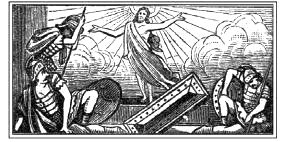
| Contents | In monte olivis consito The Mount of Olives Witnesseth |
BVM |

Composed by Fr. Augustine Thomas Ricchini (1695-1779) in 1757, this hymn is used at Matins in the Roman Breviary for the Feast of the Most Holy Rosary (Oct. 7). It is the second of a series of four hymns for the feast. See Caelestis aulae Nuntius for historical details. The subject of this hymn is the Sorrowful Mysteries: The Agony in the Garden, the Scourging at the Pillar, the Crowning with Thorns, the Carrying of the Cross, and the Crucifixion. The events surrounding the Passion of our Lord are recorded in all four Gospels: Matthew 26-27, Mark 14-15, Luke 22-23, and John 18-19, and thus form the basis for this set of mysteries.
|
| IN monte olivis consito Redemptor orans procidit, maeret, pavescit, deficit, sudore manans sanguinis. |
THE Mount of Olives witnesseth the awful agony of God: His soul is sorrowful to death, His sweat of blood bedews the sod. |
| A proditore traditus raptatur in poenas Deus, durisque vinctus nexibus, flagris cruentis caeditur. |
And now the traitor's work is done: the clamorous crowds around Him surge; Bound to pillar, God the Son quivers beneath the blood-red scourge. |
| Intexta acutis sentibus, corona contumeliae, squalenti amictum purpura, Regem coronat gloriae. |
Lo! clad in purple soiled and worn, meekly the Savior waiteth now while wretches plait the cruel thorn To crown with shame His royal brow. |
| Molis crucem ter arduae, sudans, anhelans, concidens, ad montis usque verticem gestare vi compellitur. |
Sweating and sighing, faint with loss of what hath flowed from life's red fount, He bears the exceeding heavy Cross up the verge of Calvary's mount. |
| Confixus atro stipite inter scelestos innocens, orando pro tortoribus, exsanguis efflat spiritum. |
Nailed to the wood of ancient curse, between two thieves the Sinless One still praying for His murderers, breathes forth His soul, and all is done! |
| Iesu, tibi sit gloria, qui natus es de Virgine, cum Patre, et almo Spiritu, in sempiterna saecula. |
All honor, laud, and glory be, o Jesu, Virgin-born to Thee; all glory, as is ever meet, to Father and to Paraclete. |
| Latin text from the Roman Breviary, translation by the Rt. Rev. Msgr. Hugh Thomas Henry (1862-1946). |
<- Prev |
Next-> |
